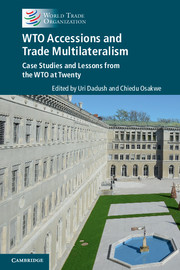Book contents
- Frontmatter
- Dedication
- Contents
- List of contributors
- Foreword
- Acknowledgements
- List of abbreviations
- Editors' note
- PART I WTO accessions, the trading system and the global economy
- PART II Overview: systemic outcomes from accessions
- PART III Members’ perspectives on accession negotiations
- PART IV Working party chairpersons’ perspectives on accession negotiations
- PART V Salient features inWTOAccession Protocols
- 29 Market access goods negotiations: salience, results and meaning
- 30 Services market opening: salience, results and meaning
- 31 WTO accession and the private sector: the nexus of rules and market opportunities
- 32 WTO accession and accession to the Agreement on Government Procurement: what is the relationship? Why should WTO acceding governments also consider GPA accession?
- 33 Energy-related rules in Accession Protocols: where are they?
- 34 Domestic framework for making and enforcing policies
- 35 Export duty commitments: the treaty dialogue and the pattern of commitments
- 36 Disciplining state trading practices: lessons from WTO accession negotiations
- 37 Intellectual property rights protection: the plus/minus debate from a least-developed country perspective – sense and nonsense
- 38 The future of multilateral investment rules in the WTO: contributions from WTO accession outcomes
- 39 Sanitary and phytosanitary measures: trends in accession plurilateral negotiations
- 40 Strengthening transparency in the multilateral trading system: the contribution of the WTO accession process
- PART VI Conclusion
- Annex: Contributor biographies
- Index
- Plate section
39 - Sanitary and phytosanitary measures: trends in accession plurilateral negotiations
from PART V - Salient features inWTOAccession Protocols
Published online by Cambridge University Press: 05 November 2015
- Frontmatter
- Dedication
- Contents
- List of contributors
- Foreword
- Acknowledgements
- List of abbreviations
- Editors' note
- PART I WTO accessions, the trading system and the global economy
- PART II Overview: systemic outcomes from accessions
- PART III Members’ perspectives on accession negotiations
- PART IV Working party chairpersons’ perspectives on accession negotiations
- PART V Salient features inWTOAccession Protocols
- 29 Market access goods negotiations: salience, results and meaning
- 30 Services market opening: salience, results and meaning
- 31 WTO accession and the private sector: the nexus of rules and market opportunities
- 32 WTO accession and accession to the Agreement on Government Procurement: what is the relationship? Why should WTO acceding governments also consider GPA accession?
- 33 Energy-related rules in Accession Protocols: where are they?
- 34 Domestic framework for making and enforcing policies
- 35 Export duty commitments: the treaty dialogue and the pattern of commitments
- 36 Disciplining state trading practices: lessons from WTO accession negotiations
- 37 Intellectual property rights protection: the plus/minus debate from a least-developed country perspective – sense and nonsense
- 38 The future of multilateral investment rules in the WTO: contributions from WTO accession outcomes
- 39 Sanitary and phytosanitary measures: trends in accession plurilateral negotiations
- 40 Strengthening transparency in the multilateral trading system: the contribution of the WTO accession process
- PART VI Conclusion
- Annex: Contributor biographies
- Index
- Plate section
Summary
ABSTRACT
Since 1947, effective levels of average tariff protection have declined, as regulatory protectionism – behind the border – has risen. To a large extent, the greater gains from continued trade opening lie in the area of pro-competitive domestic regulatory reform, codified in duly enacted legislation with associated implementing regulations. In the practice of WTO accession negotiations, specific obligations have focused more on regulatory areas of the foreign trade regime. The evidence from thirty-three deposited Accession Protocols shows that there have been ninety-three specific obligations undertaken on sanitary and phytosanitary (SPS) measures. Pursuant to WTO Accession Protocols, these are now integral to the Marrakesh Agreement Establishing the World Trade Organization (WTO Agreement). The quantum of citation in WTO jurisprudence in the area of SPS is considerable: since 1995, 42 out of 494 WTO dispute settlement cases have cited the WTO Agreement on Sanitary and Phytosanitary Measures in the request for consultations. This chapter examines the evolution of accession results on SPS from 1995 to 2015, and their contributions to the enhancement of the existing WTO legal and policy framework on SPS. Specifically, this chapter focuses on the increasing importance of SPS regulatory issues in the foreign trade regimes of WTO members, the substance of specific SPS obligations undertaken by Article XII members and their relationship to the WTO Agreement, and the core questions that have emerged on the SPS accession treaty dialogue in the context of customs union agreements. As demonstrated in this chapter, SPS accession commitments undertaken by thirty-three Article XII WTO members have exercised a significant influence on WTO jurisprudence. To a large extent, this has further clarified and strengthened WTO law.
Recent studies show that trade protectionism remains a challenge. Protectionism has been on the rise across the world over the past several years. With the increase in WTO jurisprudence, potentially trade-restrictive measures have become more sophisticated, that is, less clear. The trend suggests both tariff and non-tariff measures, of which measures aimed at protecting human, animal or plant life or health constitute a considerable part. To better counter the protean nature and pernicious trade effects of murky protectionism in this area of the foreign trade regime, the negotiating treaty dialogue in accession negotiations has been more pointed, targeted and exhaustive, culminating in a record ninety-three WTO accession commitments on sanitary and phytosanitary (SPS) measures undertaken by thirty-three Article XII WTO members.
- Type
- Chapter
- Information
- WTO Accessions and Trade MultilateralismCase Studies and Lessons from the WTO at Twenty, pp. 850 - 884Publisher: Cambridge University PressPrint publication year: 2015



